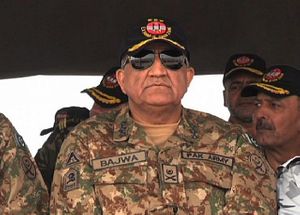Yesterday, the prime minister confirmed the appointment of Lt. General Qamar Javed Bajwa as Pakistan’s new chief of army staff (COAS). Bajwa, who is now being promoted to the rank of four-star general, will replace General Raheel Sharif following his scheduled retirement on Tuesday. Meanwhile, Lt. Gen. Zubair Hayat has been appointed the chairman of the Joint Chief of Staff Committee (CJCSC), as Pakistan’s Army undergoes a reshuffle up top.
Bajwa is the fourth army chief that Prime Minister Nawaz Sharif has appointed. With Gen. Raheel Sharif, the prime minister proved to be third time lucky, after having been removed from the prime minister house by his previous two picks, Gen. Waheed Kakar and Gen. Pervez Musharraf.
Every time Nawaz Sharif has had to appoint the COAS, the most powerful individual in Pakistan, he has aimed to reduce the clout that accompanies the position. In this regard, the appointment of Bajwa – the most junior of the four officers in contention – is perfectly understandable.
Of the two lieutenant generals passed over for the COAS and CJCSC posts, Lt. Gen. Ishfaq Nadeem Ahmed was closest to the outgoing army chief. Appointing Lt. Gen. Ahmed as the chief of General Staff (CGS) was the first major decision that Raheel Sharif took after becoming the COAS. The ongoing military operation Zarb-e-Azb, which was launched to target militant groups in Pakistan’s volatile northwest region, is also believed to be the brainchild of Ahmed, who has also participated in the Swat Operation and served in Waziristan. Despite being apolitical, Ahmed has been described as blunt and assertive, especially during his meetings at the Prime Minister’s House as the CGS.
While Ahmed’s dominant personality and closeness to Raheel Sharif might have put the prime minister off, Lt. Gen. Javed Iqbal Ramday’s political and judicial affiliations might have resulted in him being overlooked as well. Ramday is related to former Supreme Court judge Justice Khalilur Rehman Ramday and comes from a family with a political background.
Meanwhile, Lt. Gen. Zubair Hayat’s seniority might have helped Nawaz Sharif pick him as the CJCSC, which is higher up the pecking order in the Army ranks.
For the prime minister, Bajwa ticks many of the right boxes. Pakistan’s new army chief has identified internal extremism as a bigger threat to the country than India. This is despite him having worked in the volatile Pakistan-administered Kashmir. He was also among the corps commanders that decided against jumping the gun when violence ensued in the capital amidst political protests orchestrated by the Pakistan Tehreek-e-Insaf (PTI) and Pakistan Awami Tehrik (PAT), as the Nawaz Sharif government clung on by the skin of its teeth.
It was in the aftermath of the 2014 protests that the Army stepped in and seized almost complete control over Pakistan’s foreign policy, refusing to cede any space to the Nawaz Sharif government, especially vis-à-vis India. It is that space that the prime minister craves the most, especially since his personal business interests align perfectly with Pakistan’s economic interests. He wants eventual free trade between India and Pakistan and the biggest stumbling block en route to its realization has been the Pakistan Army, which in turn has based its antagonism on turmoil in Indian-administered Kashmir.
If Bajwa lives up to his reputation as a more inward looking general, he might be open to reversing proxy jihad via Pakistan-administered Kashmir, which in turn would pressure the Indian government over its human rights abuses across the Line of Control. A leaked news report, revealing how the Sharif-led government is urging the Army leadership to do precisely this, resulted in a civil-military standoff last month. A general with firsthand know-how of the Kashmir situation would have a better chance of coming around on a potential national policy shift to curtail militant jihadism.
The Pakistan Army’s fixation with Kashmir, in addition to its stated aim of safeguarding the “ideological frontiers” of the country, also stems from economic reasons. Just like in India, the turbulence in Kashmir and the resulting regional insecurity has resulted in the inflation of Pakistan’s defense budget. The world’s sixth largest military, employing over half a million troops, wouldn’t appreciate endeavors that might result in its downsizing.
In this regard, the China-Pakistan Economic Corridor (CPEC) puts forward a converging point. CPEC, which was formally inaugurated last week, offers other regional powers – including India – a framework for building a symbiotic South Asian network of trade and energy sharing. The idea that states with a combined population of almost 3 billion people– India and China – could simultaneously engage in trade via a corridor running through Pakistan is what Nawaz Sharif has been trying to sell the Army leadership.
This makes the security of CPEC, which culminates in the volatile Balochistan province, a considerable challenge where the Army could invest its human resources. Three Islamic State (ISIS) orchestrated attacks in the province in the past three months, underscores the menace and the prospects that the new Army chief faces.
Even so, while the Pakistan Army’s gains might overlap with the national interest along the CPEC route, the perceived stance of Bajwa will always remain subordinate to the institutional policies of Pakistan’s military establishment. Furthermore, with Pakistan’s next general elections scheduled for 2018 and elections for the Uttar Pradesh Legislative Assembly in India due next year, 2017 should remain heavy on rhetoric against the neighboring country. This would mean that any policy shifts and mutual cooperation between India and Pakistan would have to remain behind the scenes.
If China is onboard for CPEC’s expansion into a regional economic bloc, a firm call from Beijing might just be the push that Pakistan’s civil-military leaders need to overcome differences in everyone’s interests. If – and it’s a big if as things stand – it happens, Bajwa’s appointment can help bring Islamabad and New Delhi closer.

































